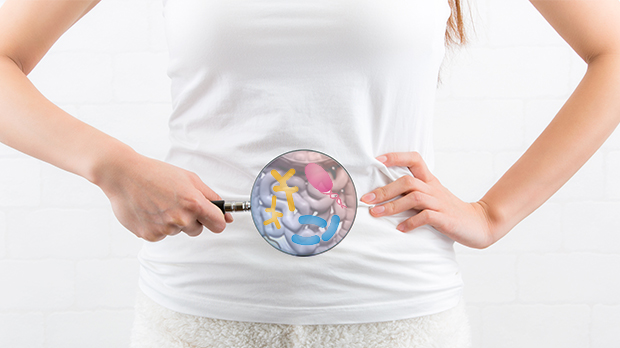Also known as the “disease of diseases”, constipation affects up to 20% of the world population every year (1). It is more of silent agony and for whatever reason, a kind of taboo. People who suffer from chronic constipation usually keep it a secret and there are also some who just don’t consider it a disease. It’s true, people have different digestive systems and different daily habits and no one seems to know when and how constipation starts. Usually, if you have three bowel movements or less in a week, with hard and dry stools that are difficult to pass, then you are most likely constipated.

Constipation is no trifling matter for it can lead to serious complications such as hemorrhoids, anal fissures, fecal incontinence, colonic conditions, and even urologic disorders (2, 3).
But there is one very good solution against constipation: a healthy diet high in fiber or so it seems. Fiber is commonly known as a “constipation problem-solver”. Now the question is that does it really help? Let’s take a look at some facts.
Summary: Chronic constipation can cause serious issues, including hemorrhoids, anal fissures, fecal incontinence, colonic conditions, or even urologic disorders. Fiber is commonly known to help relieve constipation.
Table of Contents
Fiber for constipation
The non-digestible carbohydrates in plants are known as dietary fiber. Fiber is found in almost all plant foods, including seeds, grains, nuts, fruits, and vegetables. It is categorized into two groups based on its solubility: soluble and insoluble fiber.
- Soluble fiber is found in seeds, nuts, beans, peas, lentils, oat brans, as well as some vegetables and fruits.
- Insoluble fiber is found in vegetables, wheat bran, and whole grains.
Usually, most foods that are rich in fiber contain a mix of both types of fiber in different proportions.
Summary: There are two types of fiber: soluble and insoluble. Soluble fiber sources include seeds, nuts, beans, peas, lentils, oat bran, and some vegetables and fruit. Insoluble fiber sources include vegetables, wheat bran, and whole grains. Fiber is a non-digestible carbohydrate found in plant foods.
Insoluble fiber is usually known as “roughage” because it is that tough matter found in nuts, whole grains, fruits, and the stalks, skins, and seeds of veggies. This “tough matter” doesn’t dissolve in water, and thus, it isn’t broken down by the gut and absorbed into the bloodstream. Instead, it adds to the bulk in your digestive tract. Some of the Insoluble Fiber benefits include helping with bowel movement and preventing constipation.
Summary: Insoluble fiber is known as “roughage” or “bulking” because it does not dissolve in water. Therefore, it bulks and pushes food through the gastrointestinal tract, helping with bowel movements and preventing constipation.
The soluble fiber absorbs water and forms a substance that looks like a gel. This helps dissolve the stool so it can pass easily through the GI tract. The number of good bacteria in the gut is increased by the fermentation of prebiotics (which is a type of soluble fiber in the large intestine). This could help improve your health by reducing the risk of obesity or type 2 diabetes. (4, 5) Moreover, soluble fiber binds to cholesterol and sugar and helps reduce the risk of heart diseases. These are some of the soluble fiber benefits.
Summary: Soluble fiber absorbs water and forms a gel-like substance. This gel helps dissolve stool so it passes easily through the GI tract. Prebiotics, also a type of soluble fiber, help feed good bacteria in the gut. This promotes good gut health and even prevents obesity or type 2 diabetes. The gel also helps bind to cholesterol and sugar, reducing blood lipid, cholesterol, and sugar levels.
If you are constipated and have a lower intake of fiber, consuming more fiber-rich foods could help you improve your condition (6, 7). From a recent review, about 70% of people with chronic constipation have found relief by increasing their intake of fiber. This is to say that for many people who are constipated, consuming more fiber could be enough to solve the problem.
It is recommended that men consume about 38 grams of fiber daily, while women consume about 25 grams of fiber a day. Unfortunately, it is projected that most people consume less than half of the amount, only reaching between 10–15 grams daily.
Summary: Increasing fiber intake can significantly help with chronic constipation. Men should consume about 38 grams of fiber per day, women about 25 grams. Most people only get about 10-15 grams per day, so many should think about ways to boost fiber intake for optimal health.
Consuming fiber makes constipation worse in some other cases
Theoretically speaking, fiber should help with the prevention and treatment of constipation. However, this might not be the case for everyone. While for some individuals, fiber prevents constipation; for other people, it makes the situation worse.
Also, even though we have pointed out that the consumption of fiber is useful for increasing bowel movement and thus help reduce constipation, it does not help with other symptoms of constipation like bloating, gas, stool consistency, and pain. (8, 9) If you want to find out if an increased fiber intake would help with constipation issues, you have to determine the cause of constipation in the first place. Constipation can be caused by:
Certain medications or supplements: some of the major medications include antidepressants, opioid painkillers, antacids, and antipsychotics.
Lifestyle factors: low consumption of dietary fiber, low fluid consumption, and idleness.
Diseases: some of the diseases that could lead to constipation are inflammatory bowel disease, irritable bowel disease, neurological conditions like Parkinson’s disease, and diabetes.
Unknown conditions: the reason why many people are constipated is unknown, and this condition is known as chronic idiopathic constipation.
Some studies have pointed to the fact that two people can have the same daily intake of fiber, yet one of them could get constipated, while the other not will have no problem at all. However, you should not adopt a low-fiber or high-fiber diet on a whim, without consulting a dietitian.
Summary: In most cases, increasing fiber intake will help constipation. However, in some cases, it could make constipation worse. More fiber intake also won’t solve bloating, gas, stool consistency, and pain issues. Certain medications or supplements, lifestyle factors such inadequate exercise, chronic diseases, or even unknown conditions can cause constipation issues. Consult with a dietitian before increasing fiber intake.
Conclusion
In most cases, fiber helps prevent constipation. It’s true, a diet high in fiber can also have some side effects, like bloating, but it is not up to you to decide whether you should raise your daily intake of fiber or not. If you struggle with constipation, it is better you see a doctor first.
Constipation is a serious disease and if not taken care of, it can lead to serious complications. Since everything is connected in our bodies, constipation can also be triggered by stress, sudden changes in your activities or diet, not drinking enough water, problems with the nerves and muscles in your digestive system, and so on.
In some cases, constipation results from an improper diet and improper hydration. If this the case, then you’ll have to teach yourself to eat and drink water again. There are some certain kinds of fiber supplements that can help in chronic constipation, like, say, the psyllium seeds. But before you decide on any of these solutions, we repeat the same advice: go see a doctor!
Summary: It’s best to see a doctor if you struggle with chronic constipation. In some cases, constipation is relieved by proper fiber intake and good hydration. Some people may even need a fiber supplement, such as psyllium seeds, however you should always consult with a doctor before trying any methods.
So, going back to the question of whether fiber helps reduce constipation or not, we could rightly say that the answer varies with each individual. For some people, the consumption of fiber would be the best choice they could make for better health, while for others, not so much.
However, the fact remains that irrespective of whatever side of the coin you find yourself, under no circumstances should you stay away from the healthy fiber. Your body really needs it.

